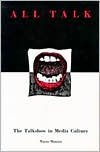

 |

|

The average rating for All Talk: The Talkshow in Media Culture based on 2 reviews is 3 stars.
Review # 1 was written on 2012-08-23 00:00:00 Joseph Matthews Joseph MatthewsI read this about a decade ago. My review (and the book) seem all the more relevant after this last campaign. "Talk shows have taken over the airwaves. Aggrieved, frustrated Americans have created a high-decibel, raucous, echo chamber where opinions rule, facts are ignored, and "one-sided pugnacity," specious denunciations, and "delirious gossip" determine the way we communicate with our leaders." Howard Kurtz dissects this phenomenon and finds it wanting. "Anyone can say anything, at any time, without contradiction. It is raw, it is real, and it is immensely popular. The gate keepers of the elite media have been cast aside and the floodgates thrown open:' The "Open Line" of the airwaves. Debate has coarsened. Context and subtlety have been discarded. "Extremism in the pursuit of ratings is no vice." Persuasion is no longer the point. The only value that counts is audience share. "Talk is cheap. The armchair warriors defuse world crises, wipe out budget deficits, and solve the welfare mess, all before the commercial break: And it's all make-believe ... " Kurtz insists this is "bad news for journalism, but more important, it's frequently bad for the country:' Politicians react to· the short-term quick opinions offered as analysis and become obsessed with "winning the week .... Short term maneuvering becomes more important than long-term policy." Hence the talk show candidates Alan Keyes and Pat Buchanan who have no experience and Know-Nothing. Crossfire began as a three hour verbal pissing match between Pat Buchanan and Tom Braden on a local Washington radio station. It was quite popular. Victor Gold, an Agnew speech writer called it "a form of ideological masturbation. You get your jerk liberal versus your jerk conservative." The show moved to television, where a guest was added although the visitors soon realized they were just foils for the "Braden Buchanan Act." One said, "1 felt 1 was in a barroom brawl... the only thing missing was the beer bottle over my head." Braden soon tired of the charade and Michael Kinsley was courted to replace him - not a fair exchange, because Braden was a true leftist while Kinsley was a moderate and would often argue a liberal point of view he didn't necessarily believe in. But TV needs the cachet a print journalist could provide, so despite his misgivings, Kinsley, a Rhodes scholar, fell for the money. The TV version was very different. They only had twenty two minutes rather than several hours, and the premise that every issue has a left and right side was spurious to begin with. The atmosphere was even more confrontational and the emphasis was on drama rather than enlightenment. Ironically, Buchanan, the ideologue, was an articulate proponent of the far right, while Kinsley, ever the moderate, continued to portray a more centrist position - hard-core leftwing ideas rarely make it to television. Soon Buchanan was on three of the pundit shows, and that was enough to convince him he was qualified to be president. William Kristol explains the deceptive nature of the celebrity status that television confers, "You can go through an airport and someone says, 'You were great on Crossfire' and you say, Hey, I'm famous. You can deceive yourself that you really have influence because you're on television, when all you're doing is being a pundit. You're like one of the guys on Hollywood Squares." But television is a genre that values glibness and brevity above all. "Too many dependent clauses might drive precious viewers away." Hot air becomes confused with absolute truth. Ted Koppel, who Kurtz suggests has one of the better shows - even though he succumbed to the OJ. hysteria for the sake of ratings - summed them up: "There is a tendency to walk away from that program and say, 'Great.' But what did anyone say? It's like eating Fritos or Cheetos. It's a terrific experience while you're doing it, but there's not a lot of nutritional value .... If there is no discrimination in the public mind between what I do and what Geraldo Rivera does, then I think we're in trouble." Congratulations, Ted, you've finally awakened and smelled the coffee. "There is something depressing, too, about the overheated and polarized nature of public debate these days. Lots of angry folks out there just want to talk back: to the media, to the authorities, to anyone who will listen. For them, talk radio [and Open Line:] is a sort of airwaves therapy, a socially acceptable way to vent their spleen or simply to feel connected to a fragmentary world ... a substitute for the conversation over the backyard fence .... For them, talk radio [is:] not about dialogue, it is simply an opportunity to rant." |
Review # 2 was written on 2010-07-28 00:00:00 Mohmmad Kabir Mohmmad KabirPretty useful. Helped me with my first studio guest, and should be useful reference in future |
CAN'T FIND WHAT YOU'RE LOOKING FOR? CLICK HERE!!!